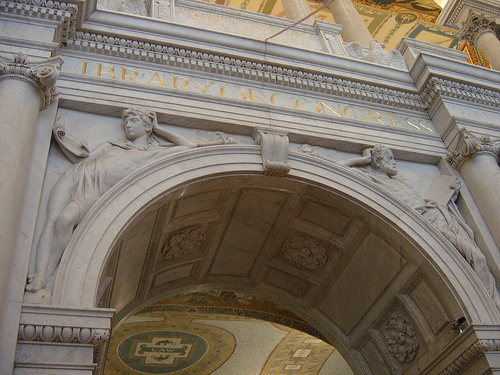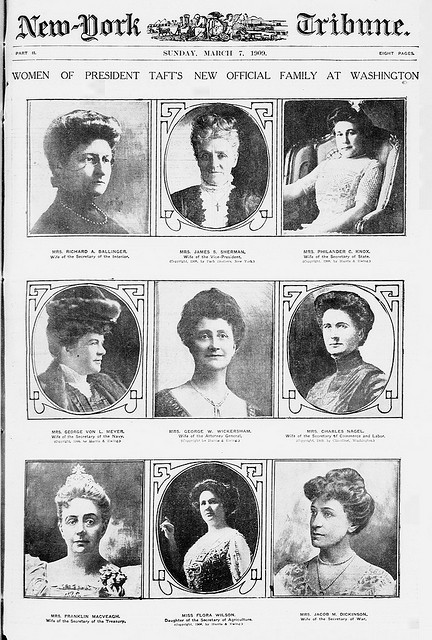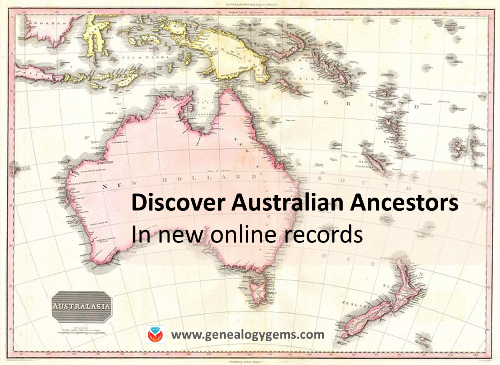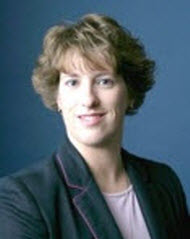How to Find What You Want at the Library of Congress
The Library of Congress has a new quick video tutorial to help us find things in their enormous collections, both offline and online.

Flickr Creative Commons image by Paull Young.
“How to Find Stuff at the Largest Library in the World” is a 5-minute introductory video. It shows how to use subject headings, research databases and other helpful tools to find books, photos, sheet music, manuscripts and more at the Library of Congress or other locations.
This video makes the Library of Congress seem much less intimidating. And we get some tempting glimpses of the inside of the Library. The tips they mention are helpful for navigating any research library though, so check it out!
Front Page News! New York Tribune Archive on Flickr

Women of President Taft’s New Official Family at Washington, New York Tribune, March 7, 1909. Cover, illustrated supplement. Library of Congress image, posted at Flickr. Click to visit webpage.
The Library of Congress has a Flickr album that’s front page news–literally! It’s a New York Tribune archive with newspaper covers dating back more than a century.
“This set of cover pages from the New York Tribune illustrated supplements begins with the year 1909,” explains the album. “The pages are derived from the Chronicling America newspaper resource at the Library of Congress. To read the small text letters, just click the persistent URL to reach a zoomable version of the page.”
“Daily newspapers began to feature pictorial sections in the late 1800s when they competed for readers by offering more investigative exposés, illustrations, and cartoons. In the 1890s, William Randolph Hearst and Joseph Pulitzer tapped into new photoengraving techniques to publish halftone photographs, and other newspapers soon adopted the practice. The heavily illustrated supplement sections became the most widely read sections of the papers and provided a great opportunity to attract new customers. The daily life, art, entertainment, politics, and world events displayed in their pages captured the imagination of a curious public.”

Available at http://genealogygems.com
We don’t often find our ancestors splashed across front-page news. But we can read over their shoulders, as it were, to see what was going on in their world and what others around them thought about these events. Newspaper articles and ads reveal fashions and fads, prices on everyday items, attitudes about social issues and more. Read all about using old newspapers for family history in How to Find Your Family History in Newspapers by Lisa Louise Cooke.
Find Australian Ancestors and More: New and Updated Genealogy Records Online
These new and updated genealogical records span three continents and date to the Middle Ages: Australia colonial portraits, New South Wales and Queensland; millions of new U.S. marriage records, a WWI online exhibit, Liverpool church records, a Romanian digital archive, German (Bavarian) civil registers, Confederate musters (GA), PA obituaries, and a Minneapolis newspaper.

Featured this week: Australia Colonial Portraits, New South Wales and Queensland
The State Library of South Australia announced a newly-digitized collection of more than 1,000 photographs of South Australian colonists. The original photos have been on display at the State Library. “In 2017 they have returned as facsimiles (along with new indexes and online catalogue records),” says a Facebook post. Click to explore the men’s photos or women’s photos online for free. Several people have already identified their ancestors in these collections, judged by comments on the Facebook post. Even better news: the images may be freely copied and used. The Library responded to a question about use with, “The images are well out of copyright. We just ask that you cite as appropriate.”
Subscription website Findmypast.com has posted new Australia content, too:
- New South Wales Parish Registers, Christ Church Cathedral Newcastle. “The records span the years 1804 to 1900 and will reveal the names of your ancestor’s parents,” states Findmypast. “Currently the collection holds just over 5,000 baptisms, around 2,200 marriages records, and just over 3,300 burials. Some burials have also been transcribed from newspapers and other sources.”
- 1881 British Census, Crew and Passengers on Ships arriving in New South Wales. “Over 19,000 records….These records pertain to British and non-British passengers and crewmen arriving at Sydney from 1 January to 31 March 1881….Each record will reveal the individual’s age, status, nationality, occupation and details of their voyage.”
- New South Wales, Closer Settlement and Returned Soldiers Transfer Files. “Over 19,000 records have been added….These land transfer records can help you determine the property dealings of your New South Wales ancestors and see if they were involved in transferring land ownership. The records also include files relating to returned servicemen from the First World War who took part in the soldier settlement scheme.”
- Queensland School Pupil Index. “This database covers over 1.6 million names drawn from 1,022 Queensland schools,” says the collection description. “The earliest date of admission is 1864…. Schools range from large city schools with admissions in the thousands to one-teacher country schools with a total enrollment of only hundreds. Some schools have long ceased to exist; others are still functioning.”
Europe – Digital image archive
Just shy of a half million images from the cultural heritage digital archive Europeana are now part of the new Creative Commons (CC) search database. Now it’s even easier to discover and share images about an ancestor’s life–and to identify images you can re-use without copyright restriction.
“A tool for discovery, collaboration and re-use, CC Search enables users to search a variety of open repositories through a single interface to find content in the commons,” explains a Europeana blog post. “The new beta version of the project, which was released in early February, includes simple, one-click attribution, making it easier to credit the source of any image. CC Search beta also provides social features, allowing users to create, share, and save lists as well as adding tags and favorites to the objects in the commons….These records can all be used for commercial purposes, and are also open for modifications, adaption, or to be built upon. Click here to learn more about WWI and other genealogy-friendly content at Europeana.
England – Liverpool
Ancestry.com has updated its collections of Church of England parish records for Liverpool, England. These databases include baptisms, confirmations, marriages/banns and burials, along with a combined database of older baptisms, marriages and burials dating to 1659.
Germany (Bavaria) – Vital Records
Ancestry.com has published a new collection of Freilassing, Germany, Births, Marriages, and Deaths, 1876-1985. “This collection contains civil registry records from Bavaria,” states the collection landing page. “It includes births covering the years 1876-1899, marriages from 1876 to 1932, and death records for the years 1876-1985. Freilassing is a community in Berchtesgadener Land, Bavaria. It is situated immediately on the German border with Austria and is adjacent to the city of Salzburg. Until 1923, Freilassing was called ‘Salzburghofen’ and this is the name given in many of the records.”
Romania – Digital Archive
Thousands of documents from medieval Romania have been digitized and published online at Arhiva Medievala a Romanie. It’s the first collection of its kind for the country, says an article at Romania-Insider.com. Because of the age and content of these documents, they likely don’t have direct genealogical research value for most people. But anyone with Romanian roots might enjoy getting a sense of the country’s deep history.
United States: WWI, Millions of Marriages and More
A new online exhibit from the Library of Congress can help you better picture your U.S. ancestors’ experiences during and after World War I. “‘Echoes of the Great War: American Experiences of World War I‘ examines the upheaval of world war as Americans confronted it— both at home and abroad,” states the webpage. “The exhibition considers the debates and struggles that surrounded U.S. engagement; explores U.S. military and home front mobilization and the immensity of industrialized warfare; and touches on the war’s effects, as an international peace settlement was negotiated, national borders were redrawn, and soldiers returned to reintegrate into American society.”
Also in the U.S.: Findmypast has added over 6.7 million records to its U.S. marriage records collection. “New additions covering 127 counties across 18 states have been added to our collection of US marriages,” states a press release. “This is the first time ever these records have been released online, providing you with brand new opportunities to expand your family tree.” The 18 states with new records are Alabama, Arkansas, Connecticut, Delaware, Georgia, Iowa, Kentucky, Maine, New Hampshire, New Jersey, North Carolina, Ohio, Oregon, Rhode Island, Utah, Vermont, Washington and West Virginia.
More from across the U.S.:
- Georgia: Confederate Muster Rolls. The Georgia Archives has digitized and published its collection of Confederate Muster Rolls. According to the site, “The majority of the company muster rolls in this series are from military organizations created by the State of Georgia during the Civil War for service within the state. These military organizations include the Georgia Army (1861), the Georgia State Guards (August 1863-February 1864), and the Georgia State Line (1862-1865). The Georgia Militia is referred to as Georgia State Troops. Some units were later turned over to Confederate service. There are also nearly 250 muster rolls from Georgia Volunteer Infantry.”
- Minnesota: Newspapers.com now hosts the entire run of The Minneapolis Star Tribune, which dates to 1867. That’s more than 54,000 issues, among which are a 1976 headliner about a teenage star in the making: Prince. (See that article here for free, just because you can).
- Pennsylvania – Obituaries. A new collection of Beaver County, Pennsylvania obituaries (1920-1969) is now online at Ancestry.com.
2 Free Resources for Finding Australian Ancestors
- Trove: Australia’s Digital Newspaper Website
- Assisted Immigration to Australia: Queensland Passenger Lists
Source for our lead image: Click here to view map of Australia
Disclosure: This article contains affiliate links and Genealogy Gems will be compensated if you make a purchase after clicking on these links (at no additional cost to you). Thank you for supporting Genealogy Gems!
Family History Library Has New Director–New Direction?
 The biggest family history library in the world just got a new boss! Diane Loosle is the new Director of the flagship Family History Library (FHL) in Salt Lake City, Utah, and the first woman to hold this job. She has exciting ambitions for the FHL and I look forward to seeing how they unfold.
The biggest family history library in the world just got a new boss! Diane Loosle is the new Director of the flagship Family History Library (FHL) in Salt Lake City, Utah, and the first woman to hold this job. She has exciting ambitions for the FHL and I look forward to seeing how they unfold.
Diane mentions three specific goals she’ll focus on between now and the end of 2014:
- “Become more family and youth-oriented through providing interactive, discovery experiences.
- Enhance the services of the library through new collaborative research areas and better access to research staff.
- Engage more patrons from the geographic community surrounding the library.”
As an example of the first objective, a FamilySearch press release says Loosle wants to “study the role of the Family History Library and 4,700 satellite branches worldwide…and how to make them discovery centers for people of all ages, not just a research facility.”
“Our centers are great places to do genealogical research,” Loosle says. “[But] we need to figure out how to balance the needs of researchers while increasing appeal to those with other family history interests. You can’t attract a younger audience and offer the same experiences. We need to offer fun experiences and activities for the entire family that will increase love, appreciation, and understanding of their ancestors.”
I admit I’ve wondered about the future of satellite family history centers as increasingly folks stay home to research online. So I look forward to seeing how she will reinvent these community resources to serve today’s (and tomorrow’s) genealogical researchers.
Loosle comes to this job with great credentials. She is an accredited genealogist who has been with FamilySearch for 19 years, where she championed new customer service initiatives. She also has an MBA, strong business and leadership skills. She is described by a senior executive at FamilySearch as “one of the most qualified and capable to ever serve in this position.”
Congratulations, Diane! We look forward to seeing what’s coming next.
